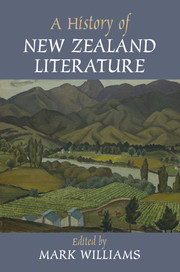Book contents
- Frontmatter
- Contents
- Notes on Contributors
- Acknowledgments
- Introduction
- PART I 1760–1920
- PART II 1920–1950
- PART III 1950–1972
- 11 Against the Social Pattern: New Zealand Fiction, 1950–1970
- 12 Janet Frame: Myths of Authorship, 1950–1990
- 13 Te Ao Hou: Te Pataka
- 14 Out of the Drawing Room and onto the Beach: Drama, 1950–1970
- 15 ‘Physician of Society’: The Poet in the 1950s and 1960s
- PART IV 1972–1990
- PART V 1990–2014
- Index
15 - ‘Physician of Society’: The Poet in the 1950s and 1960s
from PART III - 1950–1972
Published online by Cambridge University Press: 05 April 2016
- Frontmatter
- Contents
- Notes on Contributors
- Acknowledgments
- Introduction
- PART I 1760–1920
- PART II 1920–1950
- PART III 1950–1972
- 11 Against the Social Pattern: New Zealand Fiction, 1950–1970
- 12 Janet Frame: Myths of Authorship, 1950–1990
- 13 Te Ao Hou: Te Pataka
- 14 Out of the Drawing Room and onto the Beach: Drama, 1950–1970
- 15 ‘Physician of Society’: The Poet in the 1950s and 1960s
- PART IV 1972–1990
- PART V 1990–2014
- Index
Summary
In 1951, James K. Baxter addressed writers at a conference at Canterbury University College, announcing that it was ‘reasonable and necessary that poetry should contain moral truth, and that every poet should be a prophet according to his lights’. The poet ‘should remain as a cell of good living in a corrupt society, and in this situation by writing and example attempt to change it’. For Baxter, the writer was the ‘physician of society’, not only offering diagnoses of spiritual and moral sickness at large but also providing an example that would help bring about radical change. The political imperative here was critical: Baxter would later write off Auckland as a ‘great arsehole’ and Wellington as ‘a sterile whore of a thousand bureaucrats’. What was being rejected and left behind by this passionate embrace of the social purpose of poetry was the priority of self-determined cultural nationalism.
Such line-drawing bravura made for polarities, and the most polarised icons were Baxter and Allen Curnow, both magi, both masters: the latter authoritative and singular; the former, ostensibly, vernacular and communal. The polarity, however, is misleading. As self-determined shamans of New Zealand poetry, their shifting priorities overlapped, coincided, contradicted, and complemented each other. Meanwhile, very different poets, with different ideas of what poetry might mean and be and do, rose into the public domain and entered the argument, responded to each other and countered, agreed with, or fiercely disputed the terms and parameters. So many different aspects of social life were changing. Familiar pieties were being broken down, and a new sense of what rejuvenation or regeneration meant came into being as the 1950s turned into the 1960s.
Curnow's anthology, A Book of New Zealand Verse 1923–45, was revised and republished as A Book of New Zealand Verse 1923–50 and then again crucially in 1960 as A Book of New Zealand Verse 1923–60 by Penguin in their series of national poetries, alongside Spanish (1956), Italian (1958), German (1959), Russian (1962), Welsh (1967), Scottish (1970), and so on. The 1960 edition of Curnow's anthology was the most emphatic display of the gauntlet of New Zealand's canonical national authority in poetry. Baxter and others, Louis Johnson and Kendrick Smithyman among them, demurred at this objectification of a nationalist agenda, holding that in New Zealand poets need no longer be concerned with such self-determination, but rather should be free to roam at will.
- Type
- Chapter
- Information
- A History of New Zealand Literature , pp. 208 - 224Publisher: Cambridge University PressPrint publication year: 2016



